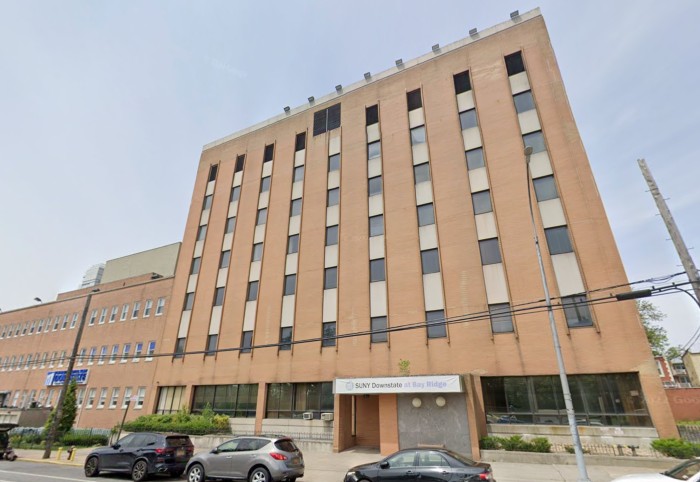Contract bankruptcy saves $6.5M in taxes on Allure’s $160M purchase of Leser property

SUNY 9036 7th Avenue (Credit- Google)
Investor Pearl Schwartz’s bankruptcy filing in December 2021 to salvage a $153 million contract to buy the Leser Group’s Bay Ridge hospital property saved the parties including the ultimate buyer, Allure Group, at least $6.5 million in transfer and mortgage recording taxes, a review of city records shows. That’s nearly the entire spread between the back-to-back transactions PincusCo reported on yesterday, in which Pearl Schwartz bought the hospital properties for $153 million from the Leser Group and then flipped them for $160 million to Allure Group.
In those transactions, Schwartz paid Leser Group $153 million for the SUNY Downstate Medical Center at 9036 7th Avenue and a one-story parking garage at 9012 7th Avenue, and then immediately sold it for $160 million to the Allure Group. Allure Group at the same time borrowed $121.5 million of which $54.5 million was new debt and outside of a bankruptcy would normally be taxed. None of those transactions were taxed.
The transfers were contemplated and organized under the watch of the U.S. Bankruptcy Court, in the Eastern District in Brooklyn, and were repeatedly described as arm’s length. It is a well-known feature of the bankruptcy process that transfer taxes are waived.
In a typical $160 million commercial sale in New York City, with a $54.5 million in new mortgage debt, the parties would pay a total of just over $6.5 million, composed of about $5.1 million in transfer taxes and about $1.4 million in mortgage recording taxes and fees. (By way of comparison, in Tavros Capital Partners and Charney Companies’ $156 million sale of 277 South 5th Street, the city collected $4.1 million in taxes and the state $1 million. For a loan comparison, when Mendel Kaff borrowed $45.4 million in new debt from Starwood Capital, for two properties including 2001 Story Avenue in the Bronx, he paid $1.27 million in recording taxes and fees.)
Schwartz filed the bankruptcy petition in Brooklyn in December after she was concerned she would lose the contract, which was signed December 1, 2021. She had borrowed $3 million from a private lender which had been used as the deposit, and she said she needed to pay off that note.
According to the Chapter 11 filing, “The Debtor’s filing was precipitated by the Debtor’s need for new financing to pay off the Note and avoid forfeiture of the Debtor’s rights under the Contract. With new financing, the Debtor will be able to satisfy the Note and close under the Contract.”
The deal was hard-fought, according to Schwartz, as affirmed in one of the filings: “I further submit that the parties engaged in substantial negotiations for over one month, negotiating a multitude of drafts of the 699 Contract [sale to Allure], and reviewing each line by line until consensus was reached on the terms of the 699 Contract. These challenging and demanding negotiations are the epitome of an arm’s length transaction which evidences the good faith necessary to confirm a plan of reorganization.”
The bankruptcy plan envisioned the tax saving. According to one of the filings, “the plan also contains other miscellaneous provisions to aid in its implementation, such as the request for an exemption under Section 1146 of the Bankruptcy Code from any transfer taxes and/or mortgage recording taxes, including any instrument of transfer or mortgage under the Plan as confirmed by the Bankruptcy Court and in furtherance of the Sunset Contract, the 699 Contract, or the 699 Financing, which would otherwise be imposed in connection with or in furtherance of the transactions contemplated by the Plan.”

